Skin aging is a natural process influenced by many factors, which include both those that you can and cannot control.
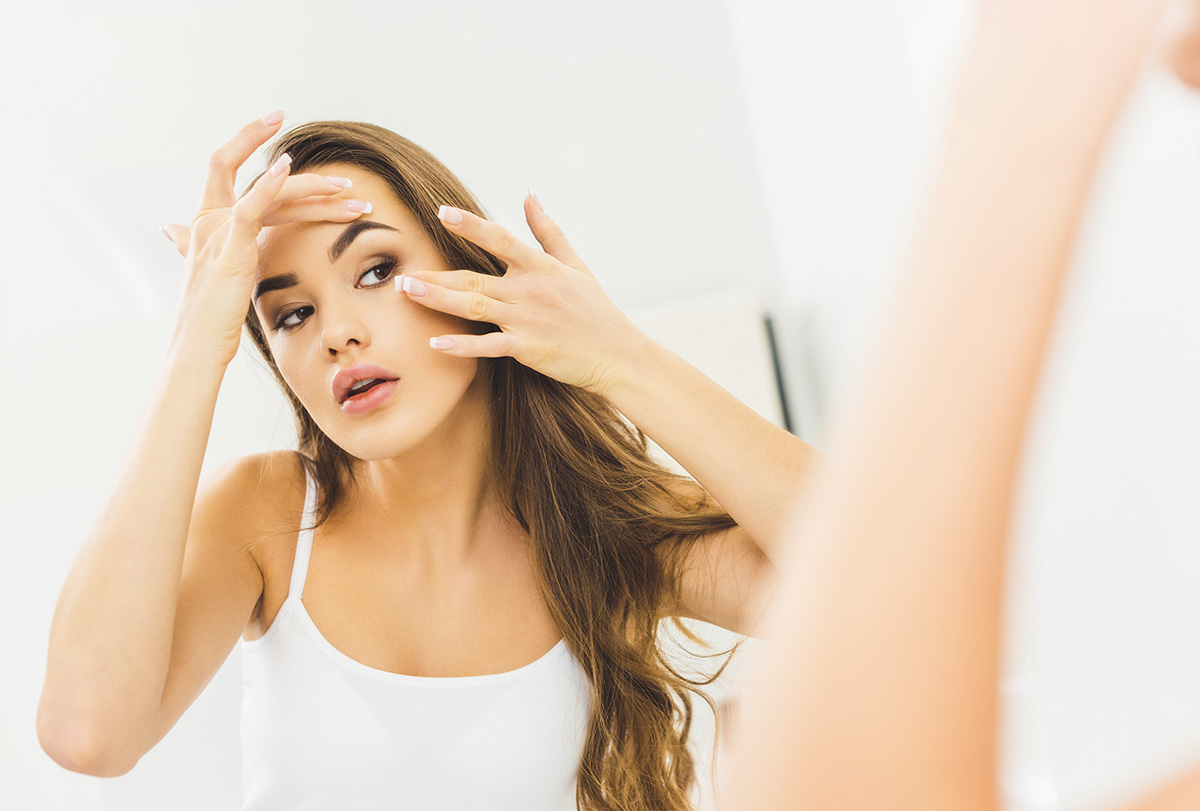
While there is no way to stop or reverse this process completely, there are things you can do to slow it down. These include cosmetic treatments, invasive procedures, and preventive measures.
10 Anti-Aging Tips
Here are some beauty hacks and anti-aging tips to keep your skin healthy.
1. Wear sunscreen
The sun emits ultraviolet (UV) radiation that penetrates deep into the skin, damaging both the epidermal skin barrier and the underlying dermis.
In addition to increasing your risk of skin cancer, sun-induced UV damage can contribute to the appearance of brown spots, red spots, and wrinkles. All these are signs of premature skin aging that will make you look older than you are. (1)
Sunscreen is one of the best weapons for protecting your skin against UV radiation. It forms a protective shield that blocks the UV rays from entering the skin. Sunscreen should be a part of your daily skin care routine even if you are staying indoors or when it’s cloudy/foggy outside.
The best strategy is to avoid going outdoors during the day as much as possible, especially when the sun is at its peak, but not everyone can do that. So, the next best thing is to apply broad-spectrum, water-resistant sunscreen with SPF 30 (or higher) all over the exposed areas of your skin. Additionally, look for sunscreens that contain zinc oxide or titanium oxide, or both for added protection.
Sunscreen tends to wear out after 2 hours of sun exposure and needs to be reapplied. Even if you are not out in the sun, make sure to reapply the sunscreen after washing your skin or sweating profusely. (2)
2. Keep your skin properly moisturized
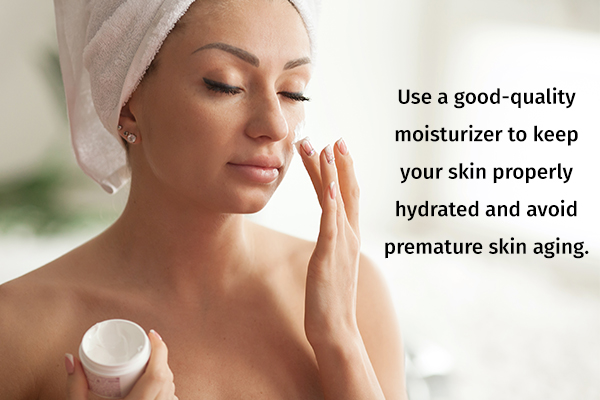
Dry skin tends to be less elastic, making it more susceptible to creasing and tearing. This kind of skin damage ultimately manifests in the form of wrinkles, fine lines, and saggy skin.
This points to the importance of using a good-quality moisturizer to keep your skin properly hydrated in order to avoid premature skin aging. This is why most antiaging products contain a moisturizing agent as their secret ingredient. (3)
Plus, there is a natural decline in the production of sebum within the skin as you grow older, making it all the more necessary to moisturize your skin regularly. The sooner you start, the better your prospects of delaying the onset of skin aging. Once the skin damage occurs, it can be impossible to undo.
You can even get antiaging moisturizers that contain ingredients that can minimize wrinkles and fine lines. When you are out to buy a moisturizer, look for such ingredients as hyaluronic acid, glycerine, jojoba oil, manuka honey, or vitamin E oil. Even better if you find a moisturizer with sunscreen that offers broad-spectrum coverage and an SPF of 30 or higher.
Skin experts recommend applying the moisturizer on damp skin, which allows the product to bind the water on your skin and seal it in for longer hydration.
3. Follow a healthy diet
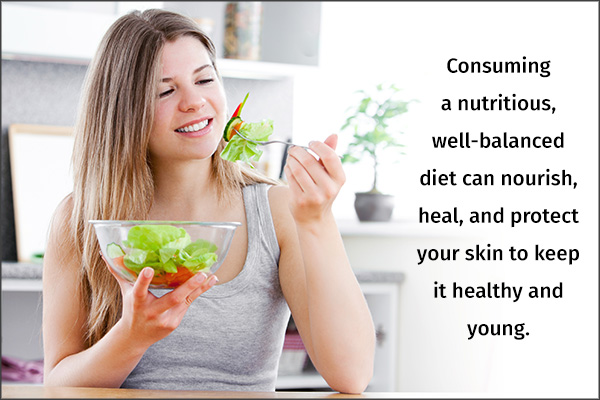
What you eat shows on your skin. Consuming a nutritious, well-balanced diet can nourish, heal, and protect your skin to keep it healthy and young.
Here are a few dietary recommendations that can help delay skin aging in different ways:
- Consume adequate amounts of protein as it helps repair damaged tissues quickly, mediates many of the skin’s physiological functions, and provides energy. (4)
- A lot of people don’t get enough micronutrients through their daily diet, which can be a major loss for your skin health. For instance, copper promotes blood circulation, (5) zinc helps maintain the epidermal barrier, iron promotes the proper functioning of the antioxidant enzymes in the skin, and selenium helps scavenge the reactive oxygen molecules that cause cellular damage through oxidative stress. (6) Hence, you must include foods that contain these vital micronutrients in an overall healthy diet.
- Vitamins A, B, (7) C, (8) and E are also a must-have, as they benefit the skin in more ways than one. They are involved in collagen synthesis, help fade pigmentation, reduce inflammation, (9) fight and repair DNA damage, and protect the important fats within the skin.
- Eat more sources of omega-3 fatty acids as they help protect your skin from photodamage, sunburn, and cancer. (10) Flax seeds and freshwater fishes are two of the best dietary sources of this nutrient, but you can find it in a range of other foods as well.
- Limit your consumption of refined sugar, trans fats, and saturated fats as all of them contribute to skin inflammation and cellular damage. Excessive sugar intake is also associated with the increased concentration of advanced glycation end-products, which trigger skin aging. (11)
- Consume probiotic and prebiotic foods that supply your system with good bacteria to maintain a healthy gut microbiome. These beneficial bacteria improve digestion, immunity, and overall body function.
Note: Your daily diet should ideally include 5 servings of fruits and veggies along with 3 servings of whole grains. If you are unable to meet your nutritional needs through foods alone, you may consider taking dietary supplements, such as collagen or fish oil supplements, but only after consulting your doctor. The doctor will go through your medical history and then recommend the right supplement accordingly.
4. Try Gua Sha
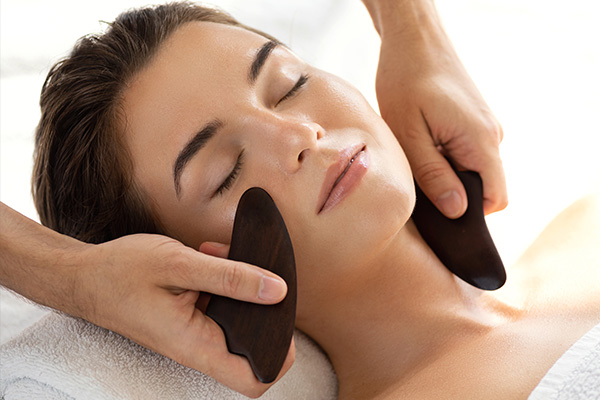
Gua Sha is an ancient Chinese therapy that makes use of a little flat pebble of jade to promote the reduction of inflammation. The tool is used to chisel out cheekbones you didn’t even know existed, de-puff hangover eye bags, temporarily tighten the skin to soften fine lines, enhance the brightness of the skin, and relieve pain.
In this therapy, experts use the tool on the skin in short strokes to improve the microcirculation in the dermis, (12) which brings in an influx of nutrients that promote cellular repair and collagen production.
Oil blends such as almond oil and coconut oil mixed with essential oils such as peppermint oil or rosemary oil can also be used during the massage. The expert may also vary the pressure of the tool on your skin.
You can either get this treatment done by an expert or purchase the tool for home use. If you want to use it yourself, then buy the one with the shape and variety that fits you the best. Apply even strokes to your skin with mild pressure, preferably in the direction of lymphatic flow.
5. Seek dermatological treatments
Although you can follow several self-care measures to ensure that your skin does not age prematurely and remains fresh and bright for a long time, natural aging is inevitable, and many people embrace this natural course cheerfully.
However, others seek ways to manage the associated features such as wrinkling skin (as everyone ages differently, and some may experience more prominent signs of aging). Several dermatological treatments can be discussed with an expert, (13) including Botox®, Fillers, high-intensity focused ultrasound, radiofrequency microneedling, skin tightening lasers:
- Botulinum toxin injections help reduce frown lines (glabellar lines) in between the eyebrows and crow’s feet at the corners of the eyes, and they can also make facial muscles tight
- High-intensity focused ultrasound is a noninvasive procedure that is a safer alternative to surgical procedures such as a facelift, and it stimulates collagen production, lifts the skin and makes it firmer
- In radiofrequency microneedling, the heat generated by the radiofrequency waves stimulates collagen production in the microneedled skin
- Skin tightening lasers use infrared light and also target the same dermal proteins (collagen and elastin)
6. Take nutritional supplements
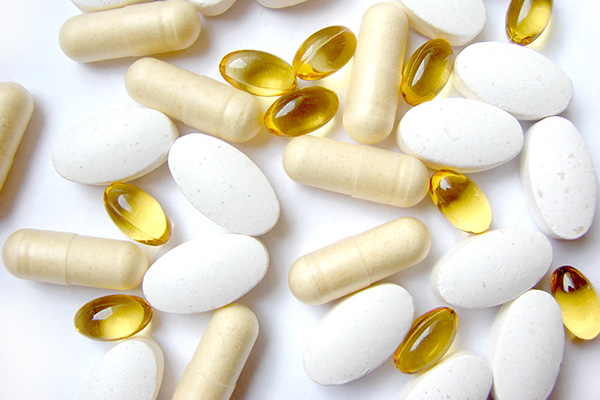
Skin aging is not merely one of the processes of getting older, but it is the cumulative result of multiple factors. Both natural and premature aging is accelerated by the oxidative stress unleashed by free radicals on cellular structures.
Free radicals are reactive oxygen molecules that attack healthy cells to cause inflammation, apoptosis (cell death), and even DNA damage (shortening of the telomere), which can lead to cancer. This kind of free radical damage breaks down the skin fibers, including collagen and elastin, that are responsible for the structural integrity of the skin.
Several nutritional supplements can minimize and repair this kind of cellular damage to slow down skin aging. But always consult your doctor before starting any of these supplements, especially if you a history of medical conditions.
Remember that supplements are not FDA regulated and they may interact with other medications that you are on. Additionally, consuming any nutrient in high doses can sometimes impair the function of one or more organs.
Different nutritional supplements can help counter the harmful effects of free radicals on skin fibers and cells. These include vitamins A, C, E, and B, curcumin, green tea extracts (epigallocatechin), coenzyme Q10, nicotinamide, resveratrol, grapeseed fruit extracts, omega-3 fatty acids, silymarin, and collagen peptides/drinks.
It has been shown that collagen supplements improve the signs of skin aging by supplying the fibroblasts with a precursor to synthesize collagen, removing reactive oxygen species, protecting the cell’s antioxidant defense system, reducing inflammation, and curbing the production of enzymes that break down skin fibers. (14)
7. Avoid stimulants
Consumption of stimulants such as alcohol and tobacco smoke is detrimental to the skin and accelerates the aging process. The harmful free radicals that are produced by smoking damage cellular repair systems, thereby affecting wound repair. Plus, they decrease the production of collagen and elastin proteins while also reducing blood flow to the skin.
Alcohol, in particular, impairs systems that fight the damage done by UV radiation. Studies have shown that heavy alcohol use (eight or more drinks per week) was associated with increased severity of nearly all features of skin aging. The kind of alcohol you drink also determines the severity of aging.
All in all, the harmful effects triggered by these stimulants within your body contribute to pronounced wrinkle formation, under-eye puffiness, nail discoloration, dull hair, uneven skin tone, and loss of facial volume. (15)
If you wish to keep your skin young and healthy, it’s best to give up alcohol completely or drink in moderation at the very least. As far as smoking is considered, quitting is the only advisable option. You should also steer clear of secondhand smoke, which can wreak havoc on your skin and overall health.
8. Establish a good skin care routine
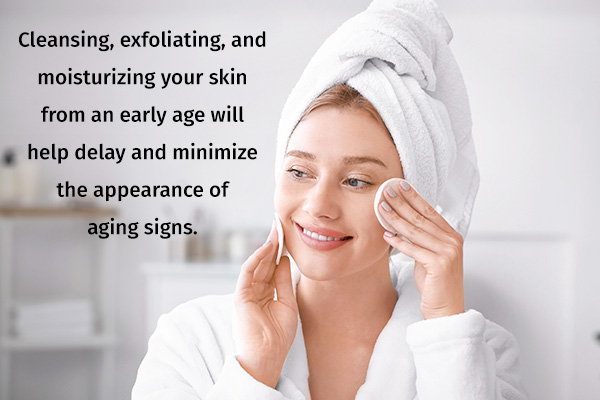
A very basic and important step for maintaining healthy skin is following a stringent skin care regimen.
Your skin is a self-regeneration organ that keeps repairing itself by shedding the damaged cells and replacing them with new ones. But as your skin matures, its ability to regenerate itself by forming new skin cells gradually slows down due to a natural decline in the production of collagen and elastin. These are structural proteins that make up your skin cells and give your skin its volume and elasticity.
As a result, the skin regeneration process becomes slower and slower, allowing wrinkles, fine lines, dark spots, and other signs of aging to set in. This kind of deep skin damage can be hard to repair once it occurs, so it’s best to be proactive with your skin care.
Looking after your skin from an early age will help delay and minimize the appearance of these aging signs, although it won’t banish them altogether. Here’s what you need to do:
- Cleanse your skin with a mild, chemical-free cleanser using gentle circular hand motions. Avoid cleansers with alkaline ingredients, such as sodium lauryl sulfate, which increase your skin’s pH and make it more susceptible to skin infections. Instead, look for low-pH cleansers that help maintain your skin’s naturally acidic environment, which is inhospitable for microbial overgrowth. If what you have is a moderately alkaline cleanser, apply a low-pH toner after it to restore your skin’s natural pH.
- Exfoliating twice a week is recommended to remove the impurities settled deep within your pores and to slough off the dead cells accumulated on the surface of your skin. You can either use exfoliating solutions, serums, or at-home peels containing alpha-hydroxy acids, azelaic acid, or kojic acid. Or you can use mechanical scrubbing devices in the form of soft sponges such as a konjac sponge, but chemical exfoliation is the better option. Whatever you do, avoid scrubs with large beads and don’t exfoliate too vigorously or too frequently. Use a lip scrub as well, at least once or twice a week.
- Keep your skin properly moisturized as has been discussed above. Different skin types require different moisturizers; consult your dermatologist about the best option for you.
- Since there is a fall in sebum production with advancing age, your skin tends to require extra hydration as you grow older. To that end, you can apply a thin layer of lightweight, highly absorbent facial oil over your moisturizer for that extra lubrication minus the greasiness.
- Add serums to your kit as well as they contain lightweight ingredients that penetrate easily into your skin. Look out for serums that contain vitamin A or its derivatives, ascorbic acid, collagen, hyaluronic acid, tranexamic acid, phloretin, soy, ferulic acid, epigallocatechin gallate, ceramides, amino cells, and peptides. You can either apply the serum directly on your clean, dry skin or over your moisturizer.
- Never go to bed with makeup on as it can settle inside your pores and clog them. Clogged pores are a major source of skin infections such as acne. Use a gentle makeup cleanser to wipe away every trace of product and dirt from your skin. Once your skin is squeaky clean, proceed with your nighttime skin care routine.
9. Invest in the right antiaging skin care products
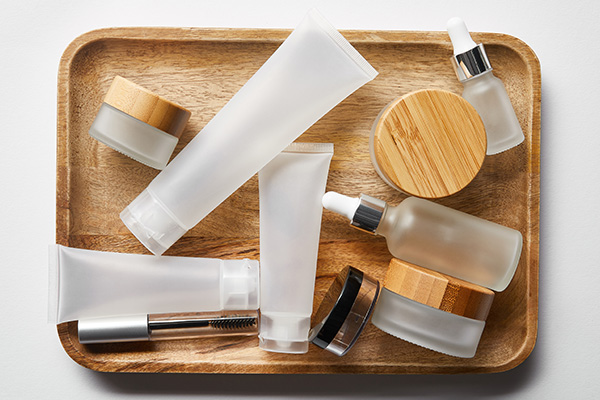
When it comes to fighting skin aging, choosing the right skin products is of primordial importance.
Low-quality antiaging products can react negatively with your skin and trigger symptoms of dermatitis such as itching, dryness, redness, and irritation. Even though these symptoms may not accelerate the aging process, they can certainly give rise to other skin problems, which can be a whole new ordeal.
When talking about product quality, it applies to the ingredients used in the product. Many products contain the same ingredients and offer the same benefits, but only some are worth a try, while others can be downright harmful to your skin. The distinguishing feature is not their composition, but how unadulterated and well formulated their ingredients are.
Therefore, do your research and choose wisely. Look for products that are labeled noncomedogenic and hypoallergenic to minimize the side effects. Also, determine which product is suitable for your skin type. If your skin is oily, go for water- or alcohol-based products. If you have dry skin, go for oil-based products.
People aged 25 or above are advised to use products containing the following antiaging ingredients:
- Nonprescription retinol is a derivative of vitamin A that stimulates collagen and elastin synthesis to keep your skin tight and supple. It is the second most effective skin care ingredient to fight skin aging, next to sunscreen. (16)
- Peptides are not only deeply hydrating, but they help increase collagen production and promote cellular repair for faster skin healing. (13)
- Amino acids such as proline, lysine, and glycine are used in the production of collagen.
- Antioxidants such as vitamin C and selenium help combat the harmful activity of free radicals, which are released in the skin through UV exposure and cause a lot of cellular damage.
Note: Avoid using retinoids at the same time as benzoyl peroxide, a medicine used to treat acne. That’s because benzoyl peroxide can oxidize the retinoid, making it less effective.
Caution: Do not buy products such as lotions and creams with strong fragrances as they can irritate your skin.
10. De-stress

Psychological stress impacts your entire body and not just your mind. It triggers various adverse reactions that disturb your body’s homeostasis.
Your body responds by activating certain systems to correct the imbalances. However, if these systems remain active for too long, they can cause long-term immune dysfunction, increased production of free radicals, and DNA damage, all of which are known contributors to skin aging, among other health problems. (17)
Stress can also exacerbate other mental health problems such as anxiety and depression, make you lethargic, trigger insomnia, and promote weight gain, among other conditions that can make you look older than you are.
Here are simple measures to manage your stress levels:
- Practice deep breathing to instantly calm yourself down.
- Meditation, yoga, and tai-chi are all relaxing exercises that can help take your mind off stressful situations while also invigorating your mind and body.
- Write a journal to vent your stress, and also keep tabs on triggers to avoid.
- Spend quality time with your friends and family as this is always a great stress buster.
- Go for a walk or jog in the green outdoors.
- Distract yourself from the stressful situation by engaging in other pleasurable activities such as painting or other hobbies that you might want to pursue.
Note: If these measures don’t work for you and the stress becomes overwhelming, it’s best to seek counseling from a mental health professional. You can even join a support group to make yourself feel less alone in the struggle.
Final Word
Your skin is bound to lose some of its youthful appeal with advancing age, but the aim is to delay that from happening as much as possible. Commit to a skin care regimen starting from your mid-20s and combine this with an overall healthy lifestyle and diet.
There are both controllable and uncontrollable factors at play when it comes to skin aging. A great skin care regimen should address the controllable factors that wreak havoc on your skin.
- Was this article helpful?
- YES, THANKS!NOT REALLY


